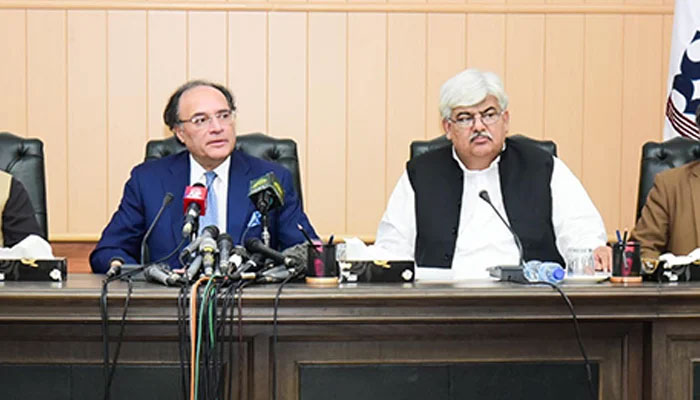Govt issues warning amid Rs3.4tr sales tax evasion
FBR study finds several registered entities misreport turnover, claim excess input tax, and use fake invoices
ISLAMABAD: Acknowledging a massive tax evasion of Rs3,400 billion in sales tax fraud alone, the government has warned non-filers and chief financial officers (CFOs) of wealthy manufacturing units to pay their due taxes and avoid misusing input adjustments, which have been identified as major sources of tax fraud at the expense of the national exchequer.
The finance minister warned that non-filers should now be concerned, as the government will pursue the biggest tax evaders. Chairman of the Federal Board of Revenue (FBR) Rashid Mehmood Langrial apologised for the past mistakes within the FBR and assured that efforts were underway to “clean the house” in order to improve the tax-to-GDP ratio to over 13%.
“Our hands are tied, and we have no choice but to act against tax fraud in major sectors. We will do what needs to be done. There will be no more bailouts from friendly countries, as the current tax-to-GDP ratio of 9 to 10 percent is unsustainable. We need to increase the tax-to-GDP ratio to 13%. Tough decisions will be made and there will be no retreat. The government is committed to taking action against the largest tax evaders,” Finance Minister Mohammad Aurangzeb said during a press conference at the FBR headquarters, accompanied by FBR Chairman Rashid Mehmood Langrial and Member IR Policy Hamid Ateeq Sarwar on Thursday.
The finance minister and FBR chairman highlighted tax evasion in five major sectors: textile, cement, beverages, iron and steel, and batteries. They revealed that annual tax evasion in these sectors stands at Rs227 billion. The fraudulent amount has already been identified, and the FBR will initiate recovery proceedings, according to the FBR chairman.
Out of the Rs3,400 billion identified in sales tax evasion, the FBR found that only 14% of 300,000 manufacturers are registered. Many registered entities were also involved in misreporting turnover, claiming excessive input tax and using fake or flying invoices.
The minister shared findings from studies on the iron and steel, cement, beverages, batteries and textile sectors, highlighting widespread malpractices. Many entities were found to be claiming input tax far beyond industry benchmarks and best practices.
Iron & Steel: Out of 33 large businesses in this sector, representing more than 50% of total reported sales, many were found evading sales tax by claiming excess input tax of Rs29 billion. The primary source of fake and dubious input tax claims is the purchase of scrap metal and coal.
Batteries: Six active cases in the battery sector, representing 99% of total reported sales, were found to have claimed Rs11 billion in excess input tax, mainly on the purchase of lead. Cement: Nineteen active cases in the cement sector revealed Rs18 billion in excess input tax claims for FY23-24, primarily on coal purchases.
Beverages: Sixteen active cases in the aerated water manufacturing sector, representing 99% of total reported sales, showed Rs15 billion in excess input tax claims, mainly on purchases of sugar, plastics and services.
Textile: A study of 228 active cases in the spinning, weaving and composite units showed excess input tax claims amounting to Rs169 billion. The main sources of dubious claims were services, chemicals, coal, packaging and irrelevant materials.
The minister said that due to the prevalence of tax evasion, enforcement measures, including arrests and criminal cases, along with improvements in the reporting system, were intensified last financial year. This led to a significant reduction in fake input tax claims in FY23-24 across all the sectors. However, despite these efforts, substantial tax evasion persists, prompting the government to plan more intensified enforcement measures.
The minister also informed that the FBR had already identified and gathered evidence of tax fraud in various sectors, including 11 cases in the battery sector, 897 in the iron and steel sector, and 253 cases of fraudulent input claims in coal purchases. Numerous cases have been identified for criminal proceedings related to sales tax fraud. Those involved in manipulating input tax adjustments, debit and credit notes, and other fraudulent activities will face legal action. A massive enforcement crackdown is planned and will be implemented in the coming weeks. The minister said that sales tax fraud is a criminal offence carrying strict penalties, including arrest and imprisonment of up to 10 years, in addition to heavy fines. Action will be taken against business owners in the case of sole proprietorships, partners in firms, directors, CEOs, CFOs and other authorised individuals in companies.
-
 Kate Hudson Gushes Over Oscar Nomination At 21
Kate Hudson Gushes Over Oscar Nomination At 21 -
 Pink Delivers Blunt Message On Split Rumours, Calls Reports 'fake News'
Pink Delivers Blunt Message On Split Rumours, Calls Reports 'fake News' -
 Pink Separates From Carey Hart Call It Quits 20 Years After Marriage
Pink Separates From Carey Hart Call It Quits 20 Years After Marriage -
 Kanye West's Best Songs: Fans Argue Over Bold Top 10 Ranking On Social Media
Kanye West's Best Songs: Fans Argue Over Bold Top 10 Ranking On Social Media -
 King Charles Secretly Relies On Advice From THIS Royal
King Charles Secretly Relies On Advice From THIS Royal -
 Jennifer Garner Reveals Beauty Choice She Makes As Botox Alternative In Her 50s
Jennifer Garner Reveals Beauty Choice She Makes As Botox Alternative In Her 50s -
 Kate Middleton Drops Four-word Message For Young Girl After Wales Visit
Kate Middleton Drops Four-word Message For Young Girl After Wales Visit -
 Shamed Andrew Uncensored ‘massages’ Should Be Refunded To Public
Shamed Andrew Uncensored ‘massages’ Should Be Refunded To Public -
 Kylie Kelce Reveals Rules She Wants Daughter Bennett To Learn At 3: No More 'passies'
Kylie Kelce Reveals Rules She Wants Daughter Bennett To Learn At 3: No More 'passies' -
 Smartphone Market Set For Biggest-ever Decline In 2026
Smartphone Market Set For Biggest-ever Decline In 2026 -
 Mud, Rain, Loincloths: All About Japan’s 200-year-old Harvest Wrestling Ritual
Mud, Rain, Loincloths: All About Japan’s 200-year-old Harvest Wrestling Ritual -
 Jonathan Majors Set To Make Explosive Comeback To Acting After 2023 Conviction
Jonathan Majors Set To Make Explosive Comeback To Acting After 2023 Conviction -
 Next James Bond: Why Jacob Elordi May Never Get 007 Role?
Next James Bond: Why Jacob Elordi May Never Get 007 Role? -
 Maddox Drops Pitt From Surname In Credits Of Angelina Jolie’s New Film 'Couture' Despite Truce From Father's End In Legal Battle
Maddox Drops Pitt From Surname In Credits Of Angelina Jolie’s New Film 'Couture' Despite Truce From Father's End In Legal Battle -
 Meghan Markle Adds Diamonds To Engagement Ring For Jordan Trip
Meghan Markle Adds Diamonds To Engagement Ring For Jordan Trip -
 Burger King Launches AI Chatbot To Track Employee Politeness
Burger King Launches AI Chatbot To Track Employee Politeness




